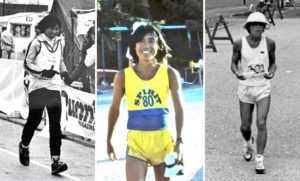


Podcast: Play in new window | Download (Duration: 28:55 — 34.9MB)
Subscribe: Apple Podcasts | Spotify | Amazon Music | Android | Pandora | iHeartRadio | JioSaavn | Podcast Index | Email | TuneIn | RSS | More
You can read, listen, or watch
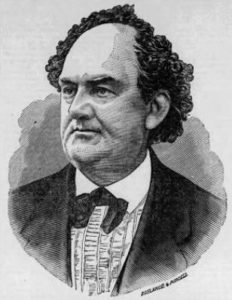

In part one of this six-day series, Foster Powell started it all in 1773 in England, seeking to reach 400 miles in less than six days. In part two, nearly a century later, the challenge was restored in America with the famous walker Edward Payson Weston, who was both cheered and ridiculed. As this third part opens, Weston seeks more than anything to reach 500 miles in six days, which had never been accomplished before. He had failed in his first serious attempt, reaching “only” 430 miles and was called by some, “The Great American Fizzler.” P.T. Barnum soon enters the story to lend support.
| Help is needed to continue the Ultrarunning History Podcast, website, and Hall of Fame. Please consider becoming a patron of ultrarunning history. Help to preserve this history by signing up to contribute a few dollars each month through Patreon. Visit https://ultrarunninghistory.com/member |
Podcast: Play in new window | Download (Duration: 32:50 — 36.3MB)
Subscribe: Apple Podcasts | Spotify | Amazon Music | Android | Pandora | iHeartRadio | JioSaavn | Podcast Index | Email | TuneIn | RSS | More
You can read, listen, or watch
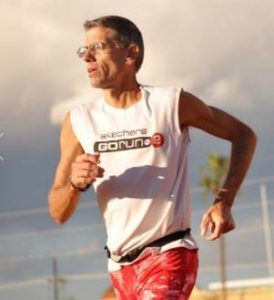

During the 1990s, Clifton had the most overall 100-mile trail wins in the world. He was a prolific ultrarunner and very fast, with more sub-15-hour 100-mile finishes on trails than anyone during that era. He would win by wide margins on hilly trail courses, sometimes by hours. He set more than 20 course records, still holding some of them after three decades.
| Help is needed to continue the Ultrarunning History Podcast and website. Please consider becoming a patron of ultrarunning history. Help to preserve this history by signing up to contribute a few dollars each month through Patreon. Visit https://ultrarunninghistory.com/member |
Podcast: Play in new window | Download (Duration: 24:17 — 28.8MB)
Subscribe: Apple Podcasts | Spotify | Amazon Music | Android | Pandora | iHeartRadio | JioSaavn | Podcast Index | Email | TuneIn | RSS | More
You can read, listen, or watch
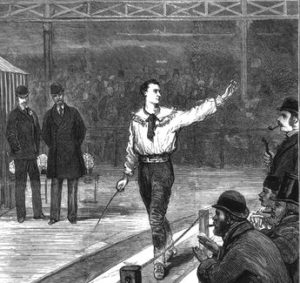

Reaching the 1870s, the six-day challenge had not yet been exported outside Britain. But that changed as the challenge reached America and moved almost exclusively indoors, thanks to Weston. He became the most famous pedestrian in history. Weston was introduced in episode 54 for his impact on 100-mile history and in episode 26 for his famed transcontinental walk. Now we will examine his early impact of importing the six-day event to America, trying to reach 400 and 500 miles.
| Help is needed to continue the Ultrarunning History Podcast and website. Please consider becoming a patron of ultrarunning history. Help to preserve this history by signing up to contribute a few dollars each month through Patreon. Visit https://ultrarunninghistory.com/member |
Podcast: Play in new window | Download (Duration: 26:20 — 31.1MB)
Subscribe: Apple Podcasts | Spotify | Amazon Music | Android | Pandora | iHeartRadio | JioSaavn | Podcast Index | Email | TuneIn | RSS | More
You can read, listen, or watch
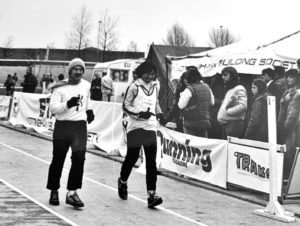

Ultrarunners who exclusively run trails may wonder, “what is this six-day race and why is it important?” The six-day race is an event to see how far you can run or walk in a period of 144 hours or six days on roads, tracks, or trails. Six days was a historic time limit established to avoid competing on Sundays, respecting local laws of the time and the religious beliefs of many of the participants.
| Help is needed to continue the Ultrarunning History Podcast and website. Please consider becoming a patron of ultrarunning history. Help to preserve this history by signing up to contribute a few dollars each month through Patreon. Visit https://ultrarunninghistory.com/member |
Podcast: Play in new window | Download (Duration: 27:57 — 33.6MB)
Subscribe: Apple Podcasts | Spotify | Amazon Music | Android | Pandora | iHeartRadio | JioSaavn | Podcast Index | Email | TuneIn | RSS | More
You can read, listen, or watch
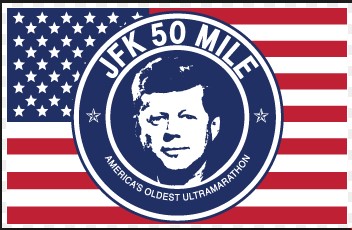





In 1963, President John F. Kennedy unintentionally played a role that provided the spark to ignite interest for ultrarunning both in America and elsewhere. The door was flung open for all who wanted to challenge themselves. An unexpected 50-mile frenzy swept across America like a raging fire that dominated the newspapers for weeks. Tens of thousands of people attempted to hike 50 miles, both the old and the very young. Virtually unnoticed was a small club 50-mile event hiked by high school boys in Maryland, that eventually became America’s oldest ultra: The JFK 50, founded by Buzz Sawyer.
Podcast: Play in new window | Download (Duration: 29:40 — 34.7MB)
Subscribe: Apple Podcasts | Spotify | Amazon Music | Android | Pandora | iHeartRadio | JioSaavn | Podcast Index | Email | TuneIn | RSS | More
You can read, listen, or watch






Spartathlon, an ultra of 246 km (153 miles), takes place each September in Greece, running from Athens to Sparta and with its 36-hour cutoff. It is one of the toughest ultramarathons to finish.
In Part 1 of this series, episode 88, the story was told how Spartathlon was born in 1982, the brainchild of an officer in the Royal Air Force, John Foden. Three servicemen successfully covered a route that was believed to have been taken in 490 B.C., by the Greek messenger, Pheidippides. The 1982 trial run set the stage for the establishment of the Spartathlon race. The race’s 1983 inaugural year is covered in this part won by Yiannis Kouros of Greece.
| There are now ten books in the Ultrarunning History series by Davy Crockett, available on Amazon. https://ultrarunninghistory.com/urhseries/
|
Podcast: Play in new window | Download (Duration: 26:30 — 31.6MB)
Subscribe: Apple Podcasts | Spotify | Amazon Music | Android | Pandora | iHeartRadio | JioSaavn | Podcast Index | Email | TuneIn | RSS | More
You can read, listen, or watch
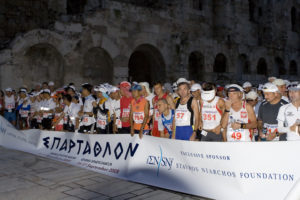





Spartathlon is one of the most prestigious ultramarathons in the world. It is a race of about 246 km (153 miles), that takes place each September in Greece, running from Athens to Sparta on a highly significant route in world history. It attracts many of the greatest ultrarunners in the world.
This is part one of a series on the history of Spartathlon. In this episode, we will cover how Spartathlon was born, a story that has never been fully told until now. It was the brainchild of an officer in the Royal Air Force, John Foden.